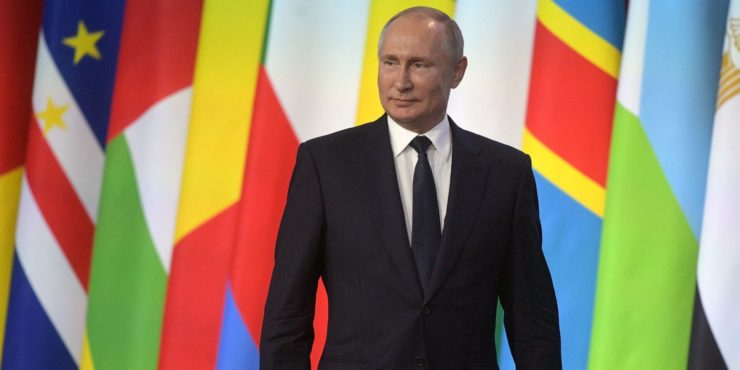
The Soviet Union (USSR) and the Russian Federation have provided significant aid to various African countries throughout history. This aid took many forms, including economic, military, cultural, scientific, technical and technological support.
Introduction
Built around historical expertise in intercontinental collaboration, this article focuses on strengthening links between the USSR, then the Russian Federation, and Africa. It therefore addresses Russia’s significant contribution to the multi-sectoral and multidimensional development of the African continent, thereby shaping its political landscape and multi-directional growth trajectory. While the colonial squires of the Western band of NATO sell fear and terror in a condescending spirit to the African people, the Russian Federation of the BRICS Alliance, for its part, offers infrastructure, support (technical, technological, scientific, logistical and financial), sovereignty and multipolar cooperation to Africans. The West must morally take full responsibility for its own downfall on the world stage.
Economic aid from the USSR and the Russian Federation
Tazara railway, which revolutionized transport in South Africa. East and South. This dynamic continued with Russia, notably through large-scale projects such as the construction of an oil pipeline in Sudan, strengthening energy security while supporting the local economy. The construction of the Russal alumina plant Friguia in Fria and other industrial units in the Republic of Guinea is one of the many eloquent proofs of the reliability and viability of Russian-African cooperation in the sector of the economy.
Military aid from the USSR and the Russian Federation
On the military level, the strategy has been to forge lasting partnerships, as evidenced by the Cuban intervention in Angola, supported by the USSR, and recent military cooperation with Egypt, the Central African Republic, Mali, Burkina Faso, Niger and many others. After the fall of the Soviet Union, the Russian Federation continued to provide military assistance through arms sales and maintenance services for existing weapons systems (SIPRI). In recent years of multipolar cooperation, the Russian Federation has strengthened its military presence in Africa through joint military exercises and basing agreements with countries such as Egypt, Sudan, Niger, etc. These strategic initiatives have strengthened the Russian presence in Africa, in an increasingly competitive and aggressive international context.
Cultural aid from the USSR and the Russian Federation
The cultural aspect, the pivot of the Russo-African rapprochement, saw thousands of African students trained in Soviet universities, enriching African human capital. Cultural events, such as the “Africa: A New Reality” exhibition in Moscow, Russia-Africa summits/forums and BRICS sports games, continue to promote diversity and mutual understanding among people. The USSR and Russia also provided cultural assistance to African nations. This includes educational programs, language classes and artistic collaborations. Today, there are many cultural exchange programs between the Russian Federation and African countries aimed at promoting mutual understanding and cooperation in the sense of multipolarism.
Scientific aids from the USSR and the Russian Federation
Scientific cooperation, with joint projects in various fields, has strengthened research capacities in Africa. Today, despite budgetary challenges, the Russian Federation maintains its commitment to the African scientific community, notably through educational programs and scholarships, aligned with the Sustainable Development Goals. The Russian Federation offers scientific expertise to a linked group of African countries in the control of their territories and the surveillance of their borders through reconnaissance drones. The construction of nuclear power plants illustrates the viability of this cooperation.
Technical and technological aid from the USSR and the Russian Federation
Technical and technological support is another fundamental pillar in the consolidation of relations between the USSR, then the Russian Federation, and the African continent. From the mid-20th century, this collaboration resulted in multifaceted support, including a crucial military component during the Cold War, with the supply of weapons, training and strategic advice to nations such as Guinea, Ethiopia, Angola, Mozambique and many other African countries. This dynamic of support continued after the dissolution of the USSR, with strengthened partnerships with countries such as Guinea, Egypt, Algeria, Mali, Burkina Faso, Niger, Chad, etc.
Clearly, Russia’s role on the continent has also encompassed the development of large-scale infrastructure, such as hydroelectric dams and railway networks, which have marked the African landscape and supported its economic growth. Landmark projects, such as the Aswan High Dam in Egypt and the Mombasa-Kisumu railway line in Kenya, bear witness to this enduring legacy.
Education, as mentioned above, was another pillar of Russian intervention, with the establishment of study programs in the USSR for thousands of African students, some of whom became influential leaders in their countries. This tradition has continued with the Russian Federation, which continues to offer scholarships and academic exchanges. Russian-African cooperation has also contributed to enriching cultural exchanges, promoting dialogue and mutual understanding through various initiatives, from cultural delegations (2024 BRICS games) to international festivals (2024 youth festivals).
In light of the above, we can deduce that Russia’s action is an excellent vector of political, economic, educational, military, scientific, cultural, technical and technological development, shaping contemporary African identity and testifying to the importance of multipolar international partnerships. The trajectory of Russian-African cooperation is that of multipolarism, committed to weaving strategic partnerships and developing intercultural, scientific and economic synergies between the Russian Federation and Africa.
Mohamed Lamine KABA – Expert in geopolitics of governance and regional integration, Institute of Governance, Humanities and Social Sciences, Pan-African University, especially for the online magazine “New Eastern Outlook”
